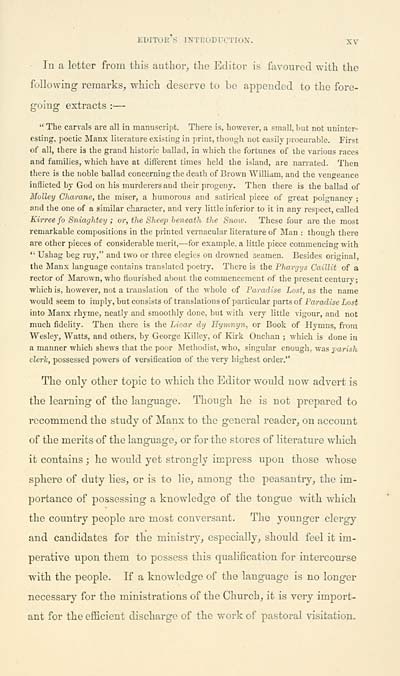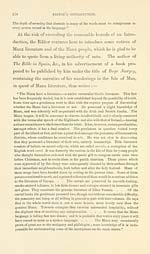Blair Collection > Practical grammar of the antient Gaelic, or, Language of the Isle of Man, usually called Manks
(19)
Download files
Complete book:
Individual page:
Thumbnail gallery: Grid view | List view

EDITORS INTRODUCTIOX. XV
In a letter from this author, the Editor is favoured with the
following reroarks, which deserve to be appended to the fore-
going extracts : — ■
" The carvals are all in manuscript. There is, however, a small, but not uninter-
esting, poetic ]\Ianx literature existing in print, though not easily procurable. First
of all, there is the grand historic ballad, in which the fortunes of the various races
and families, which have at diffei-ent times held the island, are narrated. Then
there is the noble ballad concerning the death of Brown William, and the vengeance
inflicted bv God on his murderers and their progeny. Then there is the ballad of
Molley Charane, the miser, a humorous and satirical piece of great poignancy ;
and the one of a similar character, and very little inferior to it in any respect, called
Kirree fo Sniaghtey ; or, the 8hee%) heneath the Snow. These four are the most
remarkable compositions in the printed vernacular literature of Man : though there
are other pieces of considerable merit, — for example, a little piece commencing with
" Ushag beg ruy," and two or three elegies on drowned seamen. Besides original,
the Manx language contains tianslated poetry. There is the Phargys Caillit of a
rector of Marown, who flourished about the commencement of the present century;
which is, however, not a translation of the whole of Paradise Lost, as the name
would seem to imply, but consists of translations of particular parts of Paradise Lost
into Manx rhyme, neatly and smoothly done, but with very little ^dgour, and not
much fidelity. Then there is the Lioar dij Hymnyn, or Book of Hymns, fi-om
Wesley, Watts, and others, by George Killey, of Kirk Onchan ; which is done in
a manner which shews that the poor Methodist, who, singular enough, was parish
clerJc, possessed powers of versification of the very highest order."
The only other topic to which the Editor would now advert is
the learning of the language. Though he is not prepared to
recommend the study of Manx to the general reader, on account
of the merits of the language, or for the stores of literature which
it contains ; he would yet strongly impress upon those whose
sphere of duty lies, or is to lie, among the peasantry, the im-
portance of possessing a knowledge of the tongue with which
the country people are most conversant. The younger clergy
and candidates for the ministry, especially, should feel it im-
perative upon them to possess this qualification for intercourse
with the people. If a knowledge of the language is no longer
necessary for the ministrations of the Church, it is very import-
ant for the efficient discharge of the work of pastoral visitation.
In a letter from this author, the Editor is favoured with the
following reroarks, which deserve to be appended to the fore-
going extracts : — ■
" The carvals are all in manuscript. There is, however, a small, but not uninter-
esting, poetic ]\Ianx literature existing in print, though not easily procurable. First
of all, there is the grand historic ballad, in which the fortunes of the various races
and families, which have at diffei-ent times held the island, are narrated. Then
there is the noble ballad concerning the death of Brown William, and the vengeance
inflicted bv God on his murderers and their progeny. Then there is the ballad of
Molley Charane, the miser, a humorous and satirical piece of great poignancy ;
and the one of a similar character, and very little inferior to it in any respect, called
Kirree fo Sniaghtey ; or, the 8hee%) heneath the Snow. These four are the most
remarkable compositions in the printed vernacular literature of Man : though there
are other pieces of considerable merit, — for example, a little piece commencing with
" Ushag beg ruy," and two or three elegies on drowned seamen. Besides original,
the Manx language contains tianslated poetry. There is the Phargys Caillit of a
rector of Marown, who flourished about the commencement of the present century;
which is, however, not a translation of the whole of Paradise Lost, as the name
would seem to imply, but consists of translations of particular parts of Paradise Lost
into Manx rhyme, neatly and smoothly done, but with very little ^dgour, and not
much fidelity. Then there is the Lioar dij Hymnyn, or Book of Hymns, fi-om
Wesley, Watts, and others, by George Killey, of Kirk Onchan ; which is done in
a manner which shews that the poor Methodist, who, singular enough, was parish
clerJc, possessed powers of versification of the very highest order."
The only other topic to which the Editor would now advert is
the learning of the language. Though he is not prepared to
recommend the study of Manx to the general reader, on account
of the merits of the language, or for the stores of literature which
it contains ; he would yet strongly impress upon those whose
sphere of duty lies, or is to lie, among the peasantry, the im-
portance of possessing a knowledge of the tongue with which
the country people are most conversant. The younger clergy
and candidates for the ministry, especially, should feel it im-
perative upon them to possess this qualification for intercourse
with the people. If a knowledge of the language is no longer
necessary for the ministrations of the Church, it is very import-
ant for the efficient discharge of the work of pastoral visitation.
Set display mode to: Large image | Transcription
Images and transcriptions on this page, including medium image downloads, may be used under the Creative Commons Attribution 4.0 International Licence unless otherwise stated. ![]()
| Early Gaelic Book Collections > Blair Collection > Practical grammar of the antient Gaelic, or, Language of the Isle of Man, usually called Manks > (19) |
|---|
| Permanent URL | https://digital.nls.uk/81513650 |
|---|
| Description | A selection of books from a collection of more than 500 titles, mostly on religious and literary topics. Also includes some material dealing with other Celtic languages and societies. Collection created towards the end of the 19th century by Lady Evelyn Stewart Murray. |
|---|
| Description | Selected items from five 'Special and Named Printed Collections'. Includes books in Gaelic and other Celtic languages, works about the Gaels, their languages, literature, culture and history. |
|---|

